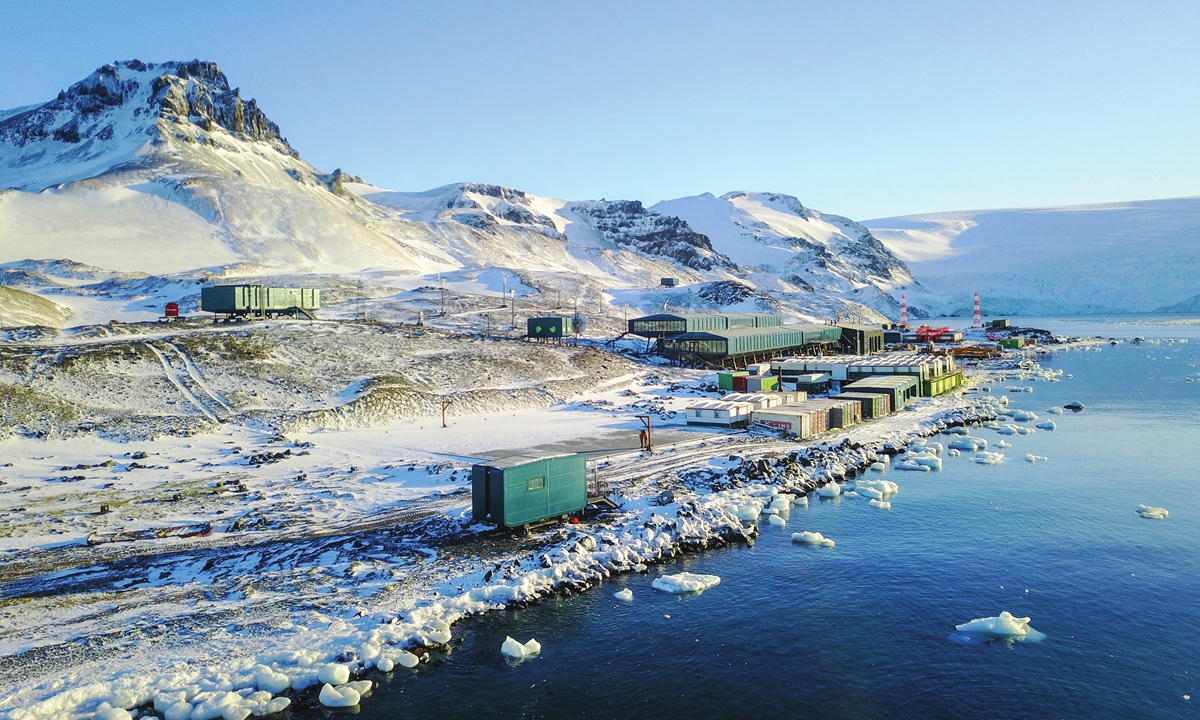The US is updating a figure that experts say could help transform American climate action and reverberate around the world - the price it puts on future damage to society caused by carbon pollution today.
That all-important number - the dollar value of the climate change harm attributable to a ton of CO2 - is known as the social cost of carbon (SCC), or as some have called it, "the most important number you've never heard of."

An aerial view of Brazil's new Comandante Ferraz Antarctic Station, located on King George Island, in Antarctica, on April 21, 2019 Photo: AFP
As part of his efforts to resuscitate America's climate change fight, President Joe Biden restored the SCC to Obama-era levels in February, after the Trump administration slashed it to a nominal amount.
Scientists argue the US social cost of carbon must be high enough to reflect the full array of climate effects, from near-term pollution to long-term sea-level rise.
Essentially it asks: How much are we willing to pay today to avoid disaster tomorrow?
It considers future illnesses and deaths from heat waves, small particle pollution, climate-enhanced natural disasters, property damage, reductions in agricultural production, disruption to energy systems, predicted violent conflicts, and mass migration.
"The energy and climate challenge that the world faces is very demanding and we need a guide for how we should be responding to that challenge," said Michael Greenstone.
He was instrumental in creating the social cost of carbon under the Obama administration.
In the US, the figure has for years formed part of cost-benefit analyses for everything, said Gernot Wagner, an expert on the economics of climate risk at New York University.
It was key in calculating US commitments under the Paris Agreement to reduce its carbon footprint.
'Powerful signal' But the number has influence far beyond America's borders.
A recent report from the University of Chicago that Greenstone coauthored stated countries including Canada, France, Germany, Mexico, and Britain invoked the US social cost of carbon when compiling their own figures.
Some adopted the US estimates wholesale.
Nearly 200 nations are set to meet in November for an all-important UN climate summit in Glasgow, Scotland.
"This number that sounds so arcane, is actually a very powerful piece of information that can help improve our climate policies," said Rachel Cleetus, policy director and lead economist for the Climate and Energy Program at the Union of Concerned Scientists.
They added that the SCC could also be a "powerful market signal."
Magic number Biden's working group of experts came up with a place-holding figure for the social cost of carbon of $51.
However, they stressed their estimates - which include separate metrics for methane and nitrous oxide - "likely underestimate societal damages," leading to speculation that the final figure could be substantially higher.
Under Trump, the number was hacked back to as low as $1, a move "difficult to justify based on science and economics," the University of Chicago report said.
But restoring the social cost of carbon to earlier levels is not good enough, experts say.
Using the Obama-era measure, for example, climate damages linked to extracting coal from the Powder River Basin in Wyoming are still six times larger than the coal's market price, Greenstone said. He says the social cost of carbon should be immediately doubled to $125.
This revision was made by cutting what economists call the "discount rate" - which determines how much the value of future climate damages are marked down - from 3 to 2 percent.
'Moral imperative' A decade of new research has dramatically broadened our understanding of the real costs of carbon pollution, including inequalities within and between nations and the impact on health.
In December 2020 the Lancet medical journal warned that a deadly mix of extreme heat, air pollution, and intense farming created the "worst outlook for public health our generation has seen."
This is not just a future scenario.
The five hottest years on record have all occurred since the 2015 Paris deal was inked.
This has stoked monstrous wildfires in America, Australia, and Siberia, while warming and rising seas have amplified storms, including 2020's record number of Atlantic hurricanes.
The world's 10 costliest weather disasters in 2020 caused insured damages worth $150 billion, according to the charity Christian Aid, which said the true cost was far higher.
John Kerry, in his first address to the World Economic Forum as a US special envoy for climate action, suggested the world is on a war-like footing.
"We are here now in this moment, not just because we understand the urgency, or because we understand the moral imperative," he said.
"We are here because we know we can't afford to lose any longer."
'Here and now' The US - the world's second-largest carbon emitter - has rejoined the Paris Agreement, which calls for capping global warming at "well below" 2 C above preindustrial levels, with an aim for a less-damaging 1.5 C.
Can the social cost of carbon help reach that goal?
Leading economists Nicholas Stern and Joseph Stiglitz warned in a recent report that "flaws" in the way it is calculated could lead to a dramatic overshoot of the Paris limits.
Meanwhile, they argue that the process should be flipped: start with the 1.5 C target and work backward, figuring out what levers are needed to get there.
But Wagner said this would only work in countries where governments embed the target into law, as in Britain.
There is consensus on one point: Climate action needs to go much, much further.
"It's here and now. It's costly. And it is a big threat," Cleetus said.
"By ignoring this signal we are taking decisions that are actually worsening the harm, today and for future generations."




